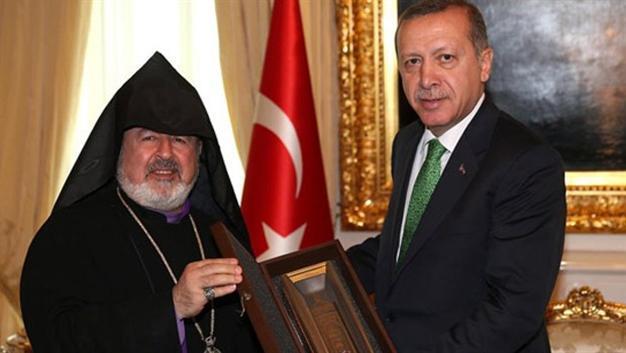Patriarch slams Germany’s 'Armenian genocide' bill as 'unacceptable'
ANKARA

The head of the Armenian church in Turkey has condemned the Bundestag’s approval of a resolution recognizing the World War I-era killings of Anatolian Armenians at the hands of the Ottoman Empire as “genocide,” claiming the vote politicized a sensitive issue.
“As we have expressed on a number of occasions, the use of this pain, which traumatized the Armenian nation, in the international political arena is a real source of sorrow and pain,” acting Patriarch Aram Ateşyan said in a letter addressed to Turkish President Recep Tayyip Erdoğan.
Ateşyan added that the painful history of the Armenian people was being utilized as a tool to “blame and punish the Turkish nation and Turkey in the international political arena,” calling all to understand the “use of the Armenian nation by imperialist powers.”
The acting Patriarch also said it was “unacceptable” for Germany to express its opinion and pass laws on the killings – an issue on which it has no right to comment on, according to Ateşyan.
“It is ethically disputable to gloss over the role of the German Empire on this tragic incident while not only blaming Ottoman Turkey but also declaring it solely responsible,” he added, warning against breaking apart “two old and neighbor peoples” through a language of hatred and enmity.
The acting Patriarch's letter sparked outrage from some segments of the Turkish-Armenian community, as the country’s leading Turkish-Armenian weekly, Agos, published a letter addressed to the religious leader, inviting him to “common sense.”
“Accept this letter as the voice of those who are part of the community [Turkish Armenians] who do not agree with the content and the tone of your opinions,” the weekly said, claiming the acting Patriarch's use of the official discourse in defining the killings was an “insult to the ancestors, the victims and the survivors.”
Germany’s lower house of parliament on June 2 overwhelmingly approved a resolution that described the 1915-16 killings of Armenians by Ottoman forces as “genocide.”
Put forward by the ruling left-right coalition and the opposition Greens, the resolution entitled “Remembrance and commemoration of the genocide of Armenians and other Christian minorities in 1915 and 1916” carries the contentious word throughout the text.
Yerevan has long sought international recognition of the “genocide,” but Ankara rejects the use of the term to describe the World War I-era killings and argues that it was a collective tragedy in which an equal numbers of Turks and Armenians died.
Ankara put up fierce opposition before and after the vote, recalling the Turkish envoy to Germany and summoning the German chargé d’affaires in Ankara for consultations.
Erdoğan also slammed Germany for approving the bill, saying his country would never accept the accusation that its forefathers committed genocide.
“Hey Germany, what do you want to do? What is your problem? First, say it. When I talked to her [German Chancellor Angela Merkel], do you know what she said to me three or four days before that incident? She said: ‘I will do my best.’ Is it your best not to attend the vote in parliament? If you had an honest manner here, you would attend. Well, a lady voted no, the second no would be your vote and I would applaud you,” Erdoğan said, adding that they were neither honest nor sincere.
 The head of the Armenian church in Turkey has condemned the Bundestag’s approval of a resolution recognizing the World War I-era killings of Anatolian Armenians at the hands of the Ottoman Empire as “genocide,” claiming the vote politicized a sensitive issue.
The head of the Armenian church in Turkey has condemned the Bundestag’s approval of a resolution recognizing the World War I-era killings of Anatolian Armenians at the hands of the Ottoman Empire as “genocide,” claiming the vote politicized a sensitive issue.